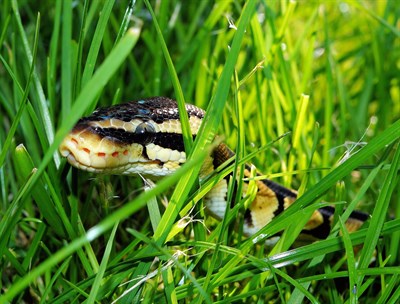Snakes as Pets

Between the puppy lovers, the cat enthusiasts and the furry rodent fans, a whole different category of pet owners exist: reptile lovers. From turtles to geckos, lizards to snakes, taking care of any reptile is a unique experience. With many safe breeds to choose from, snakes are a popular choice for those who are interested in owning a reptile.
Often associated with deadly incidents or even horror stories, snakes are commonly misunderstood but can make fascinating companion pets. Like any pet, snakes offer company and stress relief for their owners. Snakes do not require daily walks in the park and they are quiet during the day and at night. With infrequent defecation, a pet snake’s habitat is also an easy clean-up.
Before making the decision to own a snake, there are many factors to consider. Researching different pet snake breeds and their life-span and health requirements are a must. Dr. Sharman Hoppes, clinical associate professor at the College of Veterinary Medicine & Biomedical Sciences, suggests snake breeds that may or may not make a suitable pet. “Ball Pythons, King Snakes and Corn Snakes are great. Large boas and pythons do not make good pets for most people due to their large size,” Hoppes said.
Another factor to consider if you wish to own a snake is proper housing. An escape-proof aquarium is essential to prevent any harm to your snake. It is important for owners to recognize that no snake is safe without a lid that properly latches.
Snakes also require precise habitats to survive. Hoppes explains that owners should provide lighting that produces a day and night cycle. Temperatures should be 80-85 degrees Fahrenheit during the day, with a cooler temperature at night that never falls below 75 degrees. A warmer basking site that measures around 90 degrees should also be available to your pet. Under the cage heaters and heat lamps are the best way to regulate temperature. “Hot rocks” are not encouraged as they can potentially burn your pet snake. Hoppes recommends placing a thermometer on the cage to make sure the temperature in your cage is appropriate. Snake owners should research or ask a veterinarian how to provide the correct temperature, since some breeds require warmer or cooler temperatures.
Substrate, or bedding, is also necessary in creating the most comfortable and safe habitat for your snake. “Substrate can be paper, indoor or outdoor carpet, artificial turf, and aspen chips,” said Hoppes. “I do not recommend sand, because some reptiles may ingest it. I also do not recommend pine or cedar as both of these contain oils that are irritating to snakes.” Hoppes also encourages owners to provide a “hide box” for snake privacy.
If you happen to have an uneasy stomach or wince at the thought of a snake feeding on another animal, owning a snake is probably not for you. A snake’s diet can range from insects and amphibians to warm-blooded rodents, like mice, rabbits or birds. Although some owners feed their snakes live prey, Hoppes discourages this. “Snakes should never be fed live prey, it is cruel to the prey animal and can also be dangerous to the snake,” she said. “The prey animal, if not killed quickly, can bite the snake. In some cases where the snake is not warm enough or is sick, the prey animal may even extensively chew on the snake.”
Last but not least, you should consider your dedication and ability to care for a pet snake. According to Hoppes, most of the health problems that occur in snakes are a result of improper husbandry. For instance, if the cage is too cold or dry, the snake will have trouble properly shedding its skin, resulting in patches of skin left unshed. A snake in this habitat also has a chance of developing an upper respiratory infection or infections in the mouth.
If you do choose to purchase a snake after considering these important details, Hoppes recommends having new pet snakes examined by a veterinarian for skin mites and intestinal parasites before introducing them to other reptiles that might already live in your home.
Although snakes are often misunderstood and sometimes gain negative attention, they can make great companion animals and require minimal care. If you are interested in owning a snake, remember to research and consult a veterinarian that is familiar with the health requirements of snakes.
Pet Talk is a service of the College of Veterinary Medicine & Biomedical Sciences, Texas A&M University. Stories can be viewed on the Web at vetmed.tamu.edu/pet-talk. Suggestions for future topics may be directed to editor@cvm.tamu.edu.


